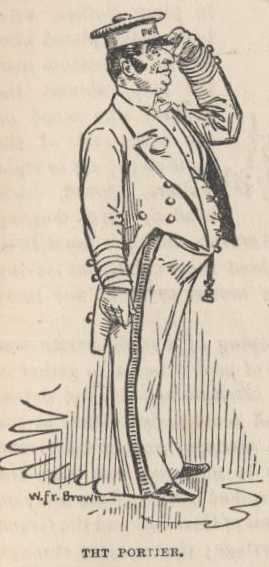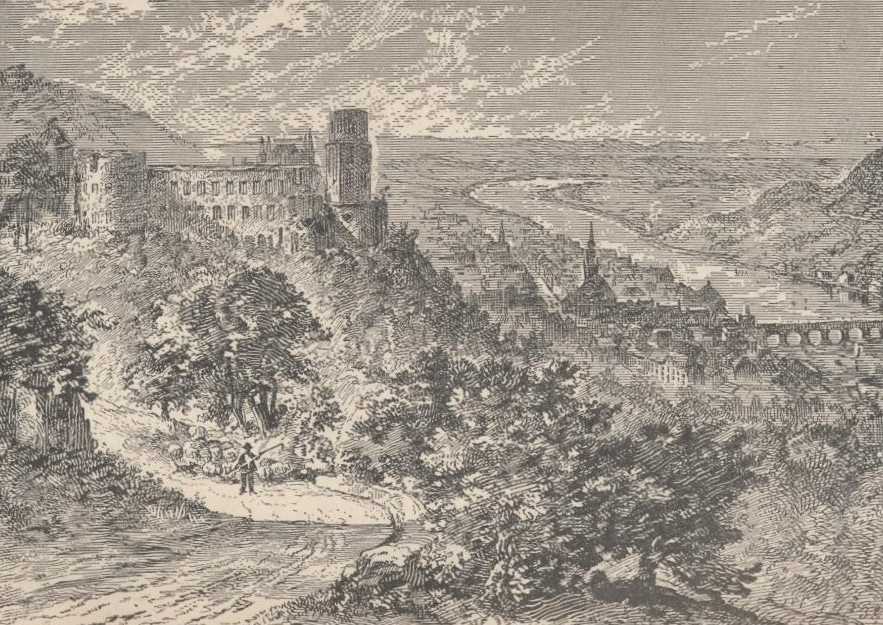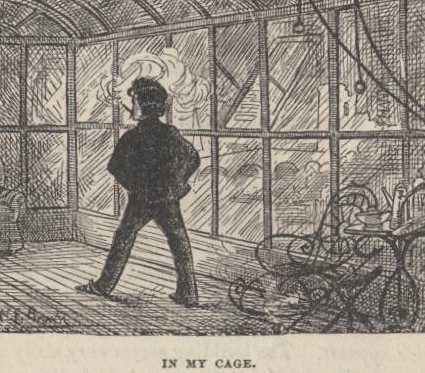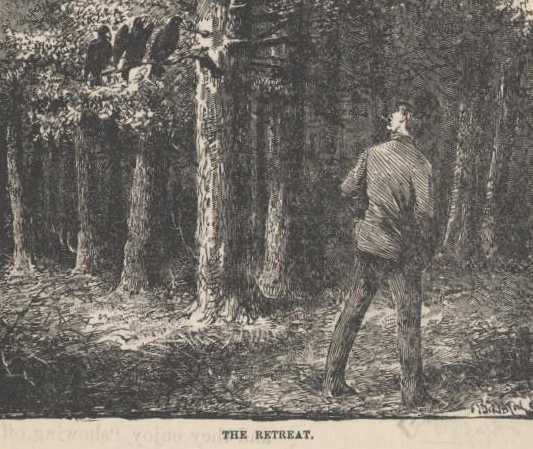The Clemens party took rooms at the Hotel Schloss in Heidelberg from May 6 to July 23 of 1878.
From Chapter 2 of A Tramp Abroad: At Heidelberg
Great Stir at a Hotel:
We stopped at a hotel by the railway-station. Next morning, as we sat in my room waiting for breakfast to come up, we got a good deal interested in something which was going on over the way, in front of another hotel. First, the personage who is called the PORTIER (who is not the PORTER, but is a sort of first-mate of a hotel) appeared at the door in a spick-and-span new blue cloth uniform, decorated with shining brass buttons, and with bands of gold lace around his cap and wristbands; and he wore white gloves, too.
He shed an official glance upon the situation, and then began to give orders. Two women-servants came out with pails and brooms and brushes, and gave the sidewalk a thorough scrubbing; meanwhile two others scrubbed the four marble steps which led up to the door; beyond these we could see some men-servants taking up the carpet of the grand staircase. This carpet was carried away and the last grain of dust beaten and banged and swept out of it; then brought back and put down again. The brass stair-rods received an exhaustive polishing and were returned to their places. Now a troop of servants brought pots and tubs of blooming plants and formed them into a beautiful jungle about the door and the base of the staircase. Other servants adorned all the balconies of the various stories with flowers and banners; others ascended to the roof and hoisted a great flag on a staff there. Now came some more chamber-maids and retouched the sidewalk, and afterward wiped the marble steps with damp cloths and finished by dusting them off with feather brushes. Now a broad black carpet was brought out and laid down the marble steps and out across the sidewalk to the curbstone. The PORTIER cast his eye along it, and found it was not absolutely straight; he commanded it to be straightened; the servants made the effort—made several efforts, in fact—but the PORTIER was not satisfied. He finally had it taken up, and then he put it down himself and got it right.
At this stage of the proceedings, a narrow bright red carpet was unrolled and stretched from the top of the marble steps to the curbstone, along the center of the black carpet. This red path cost the PORTIER more trouble than even the black one had done. But he patiently fixed and refixed it until it was exactly right and lay precisely in the middle of the black carpet. In New York these performances would have gathered a mighty crowd of curious and intensely interested spectators; but here it only captured an audience of half a dozen little boys who stood in a row across the pavement, some with their school-knapsacks on their backs and their hands in their pockets, others with arms full of bundles, and all absorbed in the show. Occasionally one of them skipped irreverently over the carpet and took up a position on the other side. This always visibly annoyed the PORTIER.
Now came a waiting interval. The landlord, in plain clothes, and bareheaded, placed himself on the bottom marble step, abreast the PORTIER, who stood on the other end of the same steps; six or eight waiters, gloved, bareheaded, and wearing their whitest linen, their whitest cravats, and their finest swallow-tails, grouped themselves about these chiefs, but leaving the carpetway clear. Nobody moved or spoke any more but only waited.
In a short time the shrill piping of a coming train was heard, and immediately groups of people began to gather in the street. Two or three open carriages arrived, and deposited some maids of honor and some male officials at the hotel. Presently another open carriage brought the Grand Duke of Baden, a stately man in uniform, who wore the handsome brass-mounted, steel-spiked helmet of the army on his head. Last came the Empress of Germany and the Grand Duchess of Baden in a closed carriage; these passed through the low-bowing groups of servants and disappeared in the hotel, exhibiting to us only the backs of their heads, and then the show was over.
It appears to be as difficult to land a monarch as it is to launch a ship.
But as to Heidelberg. The weather was growing pretty warm,—very warm, in fact. So we left the valley and took quarters at the Schloss Hotel, on the hill, above the Castle.
Location of Heidelberg:

Heidelberg lies at the mouth of a narrow gorge—a gorge the shape of a shepherd's crook; if one looks up it he perceives that it is about straight, for a mile and a half, then makes a sharp curve to the right and disappears. This gorge—along whose bottom pours the swift Neckar—is confined between (or cloven through) a couple of long, steep ridges, a thousand feet high and densely wooded clear to their summits, with the exception of one section which has been shaved and put under cultivation. These ridges are chopped off at the mouth of the gorge and form two bold and conspicuous headlands, with Heidelberg nestling between them; from their bases spreads away the vast dim expanse of the Rhine valley, and into this expanse the Neckar goes wandering in shining curves and is presently lost to view.
The Schloss Hotel:
Now if one turns and looks up the gorge once more, he will see the Schloss Hotel on the right perched on a precipice overlooking the Neckar—a precipice which is so sumptuously cushioned and draped with foliage that no glimpse of the rock appears. The building seems very airily situated. It has the appearance of being on a shelf half-way up the wooded mountainside; and as it is remote and isolated, and very white, it makes a strong mark against the lofty leafy rampart at its back.
This hotel had a feature which was a decided novelty, and one which might be adopted with advantage by any house which is perched in a commanding situation. This feature may be described as a series of glass-enclosed parlors CLINGING TO THE OUTSIDE OF THE HOUSE, one against each and every bed-chamber and drawing-room. They are like long, narrow, high-ceiled bird-cages hung against the building. My room was a corner room, and had two of these things, a north one and a west one.
Twain hired George Burk, the portier at the Schloss Hotel, as courier. (I don't have a date for this.) Apparently Twain was dissatisfied with Burk's performance as he discharged him while in Venice. I discharged George at Venice—the worthless idiot—& have developed into a pretty fair sort of courier myself since then. SLC to Joseph H. Twichell and Susan L. Warner, 20 Nov 1878, Munich, Germany
The View:
From the north cage one looks up the Neckar gorge; from the west one he looks down it. This last affords the most extensive view, and it is one of the loveliest that can be imagined, too. Out of a billowy upheaval of vivid green foliage, a rifle-shot removed, rises the huge ruin of Heidelberg Castle, with empty window arches, ivy-mailed battlements, moldering towers—the Lear of inanimate nature—deserted, discrowned, beaten by the storms, but royal still, and beautiful. It is a fine sight to see the evening sunlight suddenly strike the leafy declivity at the Castle's base and dash up it and drench it as with a luminous spray, while the adjacent groves are in deep shadow.
Behind the Castle swells a great dome-shaped hill, forest-clad, and beyond that a nobler and loftier one. The Castle looks down upon the compact brown-roofed town; and from the town two picturesque old bridges span the river. Now the view broadens; through the gateway of the sentinel headlands you gaze out over the wide Rhine plain, which stretches away, softly and richly tinted, grows gradually and dreamily indistinct, and finally melts imperceptibly into the remote horizon.
I have never enjoyed a view which had such a serene and satisfying charm about it as this one gives.
The First Night There
The first night we were there, we went to bed and to sleep early; but I awoke at the end of two or three hours, and lay a comfortable while listening to the soothing patter of the rain against the balcony windows. I took it to be rain, but it turned out to be only the murmur of the restless Neckar, tumbling over her dikes and dams far below, in the gorge. I got up and went into the west balcony and saw a wonderful sight. Away down on the level under the black mass of the Castle, the town lay, stretched along the river, its intricate cobweb of streets jeweled with twinkling lights; there were rows of lights on the bridges; these flung lances of light upon the water, in the black shadows of the arches; and away at the extremity of all this fairy spectacle blinked and glowed a massed multitude of gas-jets which seemed to cover acres of ground; it was as if all the diamonds in the world had been spread out there. I did not know before, that a half-mile of sextuple railway-tracks could be made such an adornment.
One thinks Heidelberg by day—with its surroundings—is the last possibility of the beautiful; but when he sees Heidelberg by night, a fallen Milky Way, with that glittering railway constellation pinned to the border, he requires time to consider upon the verdict.
Lost in the Woods

One never tires of poking about in the dense woods that clothe all these lofty Neckar hills to their tops. The great deeps of a boundless forest have a beguiling and impressive charm in any country; but German legends and fairy tales have given these an added charm. They have peopled all that region with gnomes, and dwarfs, and all sorts of mysterious and uncanny creatures. At the time I am writing of, I had been reading so much of this literature that sometimes I was not sure but I was beginning to believe in the gnomes and fairies as realities.
One afternoon I got lost in the woods about a mile from the hotel, and presently fell into a train of dreamy thought about animals which talk, and kobolds, and enchanted folk, and the rest of the pleasant legendary stuff; and so, by stimulating my fancy, I finally got to imagining I glimpsed small flitting shapes here and there down the columned aisles of the forest. It was a place which was peculiarly meet for the occasion. It was a pine wood, with so thick and soft a carpet of brown needles that one's footfall made no more sound than if he were treading on wool; the tree-trunks were as round and straight and smooth as pillars, and stood close together; they were bare of branches to a point about twenty-five feet above-ground, and from there upward so thick with boughs that not a ray of sunlight could pierce through. The world was bright with sunshine outside, but a deep and mellow twilight reigned in there, and also a deep silence so profound that I seemed to hear my own breathings.
The Raven
When I had stood ten minutes, thinking and imagining, and getting my spirit in tune with the place, and in the right mood to enjoy the supernatural, a raven suddenly uttered a horse croak over my head. It made me start; and then I was angry because I started. I looked up, and the creature was sitting on a limb right over me, looking down at me. I felt something of the same sense of humiliation and injury which one feels when he finds that a human stranger has been clandestinely inspecting him in his privacy and mentally commenting upon him. I eyed the raven, and the raven eyed me. Nothing was said during some seconds. Then the bird stepped a little way along his limb to get a better point of observation, lifted his wings, stuck his head far down below his shoulders toward me and croaked again—a croak with a distinctly insulting expression about it. If he had spoken in English he could not have said any more plainly than he did say in raven, "Well, what do YOU want here?" I felt as foolish as if I had been caught in some mean act by a responsible being, and reproved for it. However, I made no reply; I would not bandy words with a raven. The adversary waited a while, with his shoulders still lifted, his head thrust down between them, and his keen bright eye fixed on me; then he threw out two or three more insults, which I could not understand, further than that I knew a portion of them consisted of language not used in church.
I still made no reply. Now the adversary raised his head and called. There was an answering croak from a little distance in the wood—evidently a croak of inquiry. The adversary explained with enthusiasm, and the other raven dropped everything and came. The two sat side by side on the limb and discussed me as freely and offensively as two great naturalists might discuss a new kind of bug. The thing became more and more embarrassing. They called in another friend. This was too much. I saw that they had the advantage of me, and so I concluded to get out of the scrape by walking out of it. They enjoyed my defeat as much as any low white people could have done. They craned their necks and laughed at me (for a raven CAN laugh, just like a man), they squalled insulting remarks after me as long as they could see me. They were nothing but ravens—I knew that—what they thought of me could be a matter of no consequence—and yet when even a raven shouts after you, "What a hat!" "Oh, pull down your vest!" and that sort of thing, it hurts you and humiliates you, and there is no getting around it with fine reasoning and pretty arguments.
Excursions to Mannheim
Rasmussen notes that Twain made several trips to Mannheim, 13 miles northeast of Heidelberg, and became a friend of the American consul, Edward M. Smith, there. The journal notes two visits: The first to see a performance of Shakespeare's King Lear and the Second for Richard Wagner's Lohengrin.
See Pages 252-3 The Life of Mark Twain - The Middle Years 1871-1891: